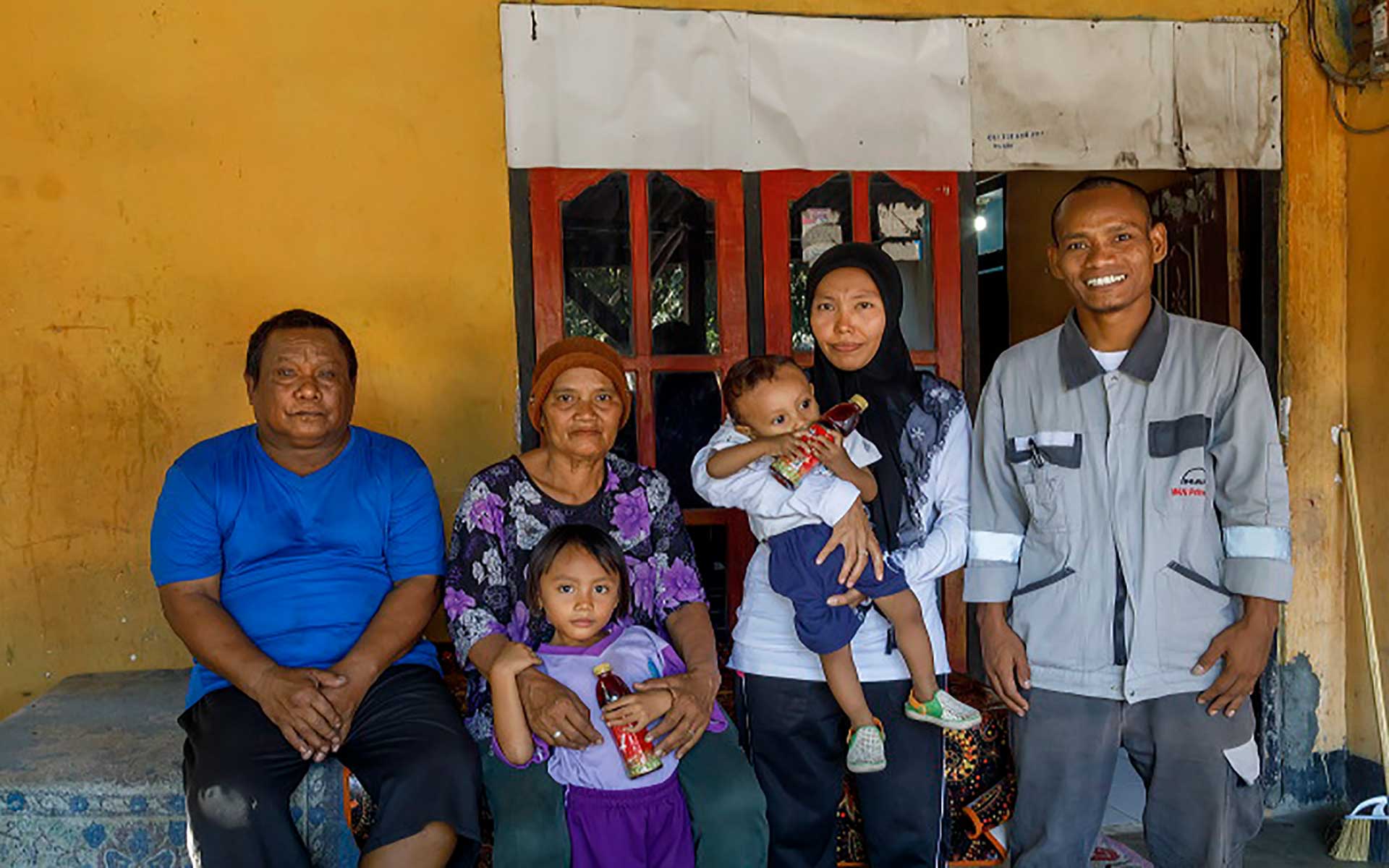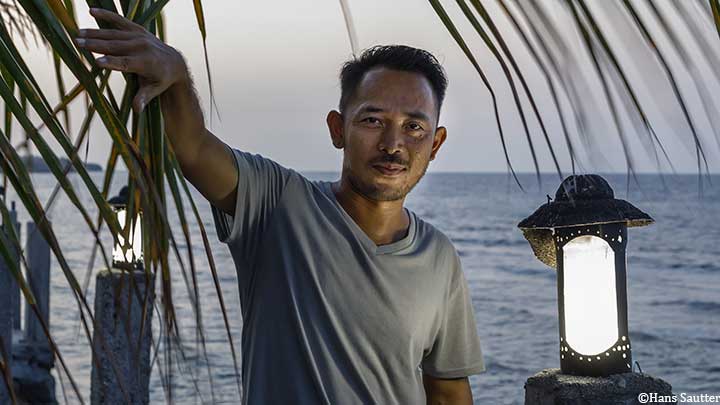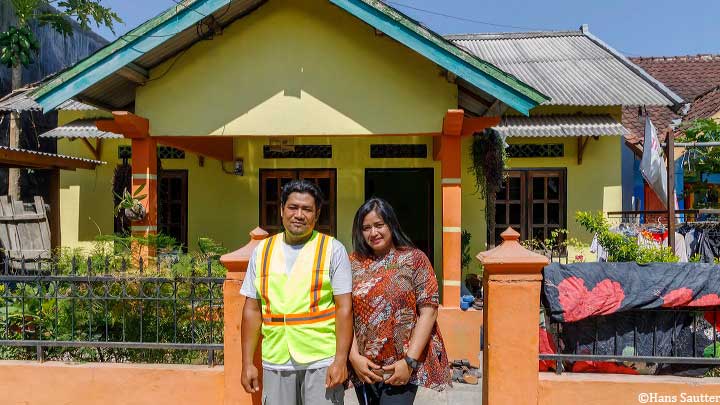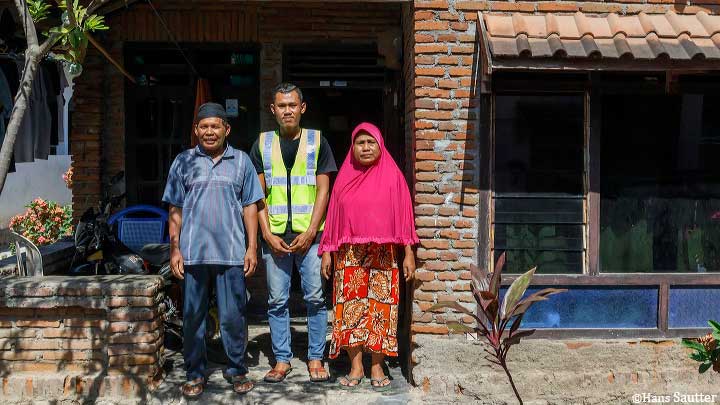What does reliable electricity mean to islanders in Indonesia’s East and West Tenggara?
They’re doing more than merely keeping the lights on for islanders in East and West Tenggara. We traveled to remote Sumbawa to speak with the locals about how three new power plants and reliable electricity are changing daily lives.
Text by Glenn van Zutphen, photographs by Hans Sautter

In comparison with Bali, Sumbawa island is huge at 15,500 square kilometers (including a few small offshore islands), but has only 1.5 million inhabitants spread across it.
Darmansyah: Logistics & Procurement, Samparageddu Village
We finally have a refrigerator that stays on and keeps our food fresh, such a blessing.
Darmansyah, who like many Indonesians only uses one name, lives about ten minutes on the other side of the plant in Samparageddu Village. The only way there is the snaking, paved, two-lane road that undulates up and down hills and around sharp corners. Now and then, the traffic slows to a crawl, blocked by overloaded trucks trying to make the grade.
Thirty-two-year-old Darmansyah lives in the small house where he was born, along with his parents, his wife and their five-year-old daughter and one-year-old son. Inside the main entry room, a couple of old chairs lead into a small eating area with a vintage cathode ray tube TV and an antique sewing machine used by his mom to make their clothing; the small space is clearly the center of family life. Darmansyah, who received on-the-job training, keeps track of all the needs of the plant, be it spare parts or administration goods, and coordinates the requests with the warehouse back on the island of Java in Surabaya. His work at the new plant in logistics and procurement supports the whole family. And with a stable supply of electricity, the water pump and the solitary light bulbs in each room of his family home now work regularly, as does the fan on hot nights. “We finally have a refrigerator that stays on and keeps our food fresh,” his father adds, “such a blessing.”

The family provider: The work Darmanyasa (right) found only ten minutes from his family home allows him to support his extended family.
Hendra: Restaurateur, Labuhan Badas District
Now we have stable electricity – it’s helping my business to keep the food fresh and people can actually see my restaurant at night with the lights on.

Fresh food daily: Blackouts had cut Hendra’s revenue nearly in half at his coastal restaurant Warung Samudra
Sitting at one of the many outdoor tables at Warung Samudra (Indonesian for “Ocean Restaurant”), under a hand-made bamboo and palm frond cover, a welcome breeze takes the edge off the mid-day heat. Looking out to sea, there’s nothing but beautiful blue water and the occasional bird diving to try to catch lunch.
The restaurant belongs to thirty-eight-year-old Hendra who, with his wife and sister, left the hustle and bustle of Bali seven years ago and moved to this charming spot on the main coastal road. “I came here because it was too crowded in Bali and we were looking for a new experience.” The waves lap against the shore. “We found peace and silence,” he says, “and I love the sea.” Warung Samudra is ideally positioned between Sumbawa Besar town and the new power plant. Hendra says that before the plant, there were up to four power blackouts each week shutting down his restaurant and costing him up to 40 percent of his revenue in lost customers. “Now we have stable electricity – it’s helping my business to keep the food fresh and people can actually see my restaurant at night with the lights on,” he says with a laugh.
Mrs. Ni Made Sumariate: Midwife, Samparageddu Village
Healthcare is much better since we can rely on consistent power
The house stands out in the neighborhood: cheerful canary-yellow walls with red and blue trim, orange columns and a low, orange wall around the front yard where Mrs. Ni Made Sumariate hangs the wash in the sun. Set apart on a small lane off the main road, it’s quiet except for the children kicking a soccer ball nearby.
Made works as a midwife and talks passionately about being able to help more healthy babies into the world. She says electricity is literally helping to save lives, whereas before vital healthcare machinery like respirators, oxygen and other equipment simply weren’t dependable due to the blackouts. Lives were in danger, but “now the healthcare is much better since we can rely on consistent power,” she says with a smile. Her proud husband stands next to her. His job in the new plant’s pumphouse has allowed them a lifestyle that many others seek. Subsistence farming and fishing are common jobs on this remote island that is three times the size of its closest neighbor Lombok, but with only about one third the number of inhabitants. So having a good paying job with health benefits at the plant is an unusual stroke of providence.

Power saves lives: Trained as a midwife to assist women in childbirth, Made has seen how reliable electricity is radically improving healthcare services.
Sulaiman: Pumphouse technician, Samparageddu Village
Our lives are so much different now, we can use electricity whenever we want for light or to keep cool.

“The new plant has changed our lives”: Sulaiman (center) is the son of Sukarti (L) and Maia (R) and works in the pumphouse.
Sulaiman sits barefoot with his father Sukarti and mother Maia on an orange tartan carpet in the living room, the television on, the fan running and a thick, green drape hanging in front of the window to keep out the sunlight and heat. Twenty-two years old and unmarried, he lives with his parents in a red brick house.
“Our lives are so much different now,” his father says, “We can use electricity whenever we want for light or to keep cool.” Like others who work at the plant, Sulaiman, a junior operating technician at the pumphouse, expresses his happiness at having a good job with inherent value and a safe perspective. Plus he’s learned new skills, received certification and has healthcare for his family. He’s a member of the operations team who run eight-hour shifts at the plant and is currently getting hands-on training in what’s known as “bunkering” or the reception of fuel. Though a pumphouse technician today, Sulaiman and others at the plant will be gradually developed into full operating mechanics as part of three-tier training program.
About the author
Glenn van Zutphen is a journalist and radio talk show host based in Singapore.
Explore more topics
MAN Energy Solutions is now Everllence.
We have adopted a new brand name and moved to a new domain: www.everllence.com. This page will also be relocated there shortly. We are working on shifting all pages to www.everllence.com.
